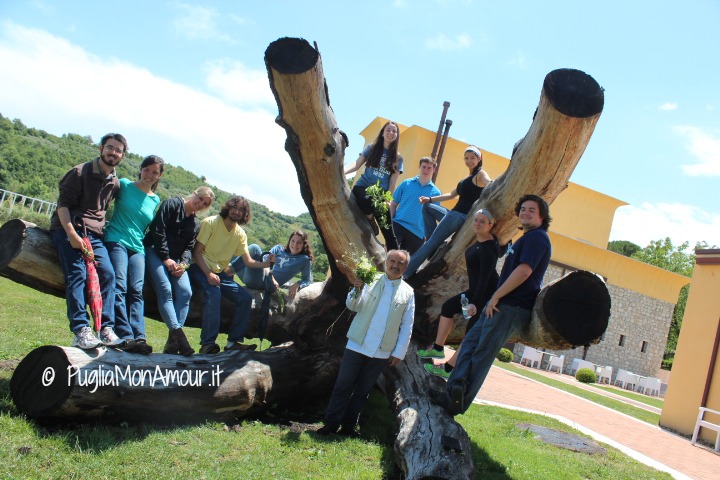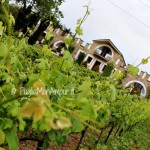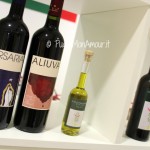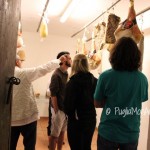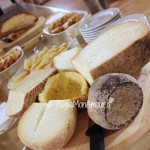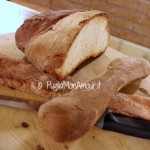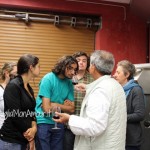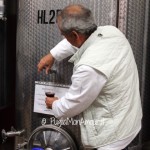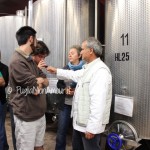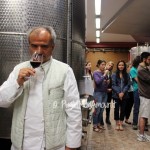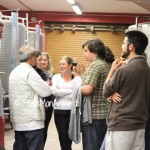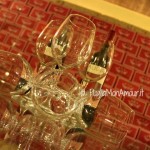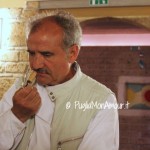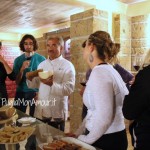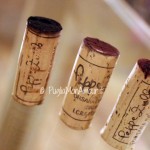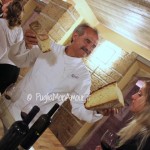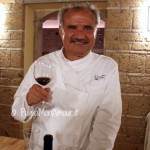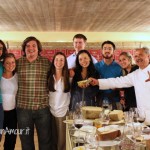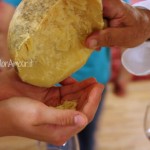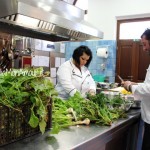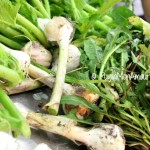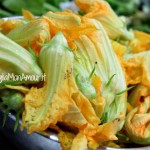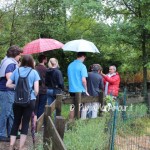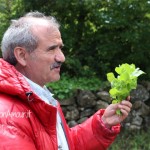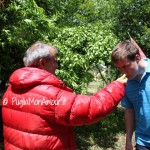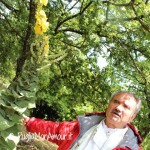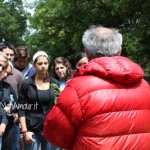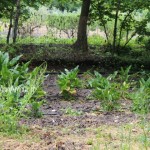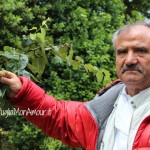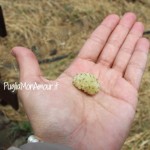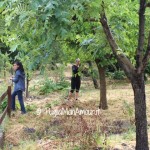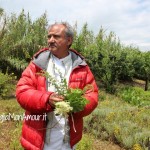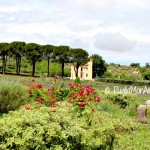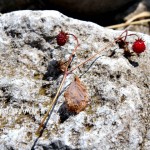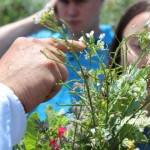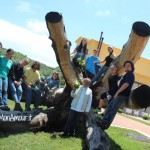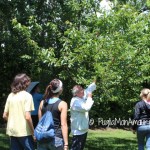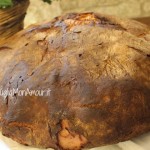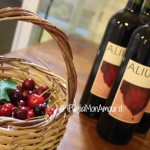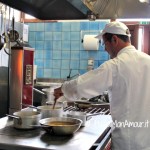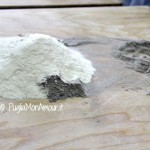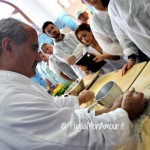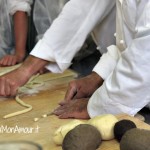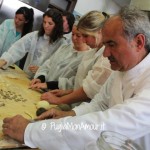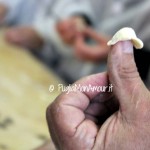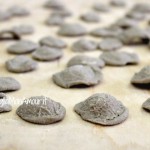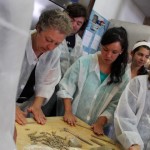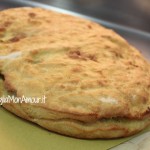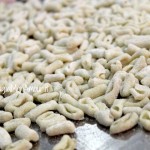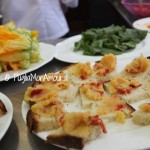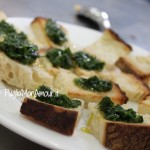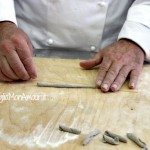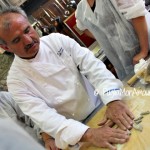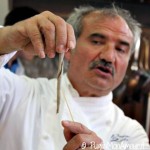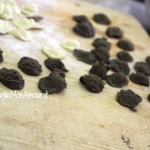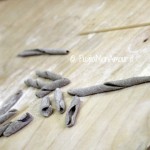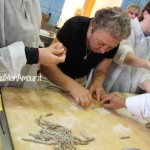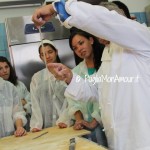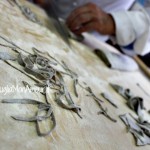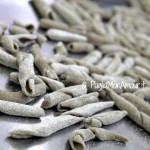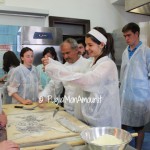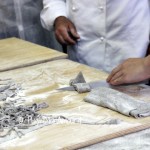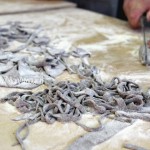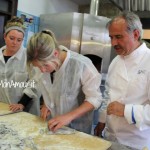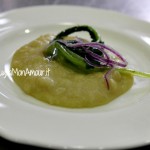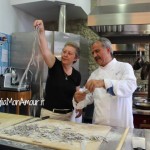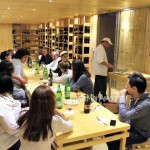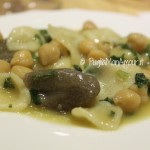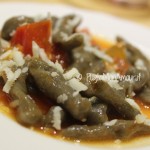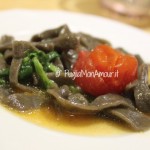The difference between young and aged wine, how it can be preserved, the colours of the corks, the pairing with cheese. And yet, how to prepare orecchiette and the meaning of local food and sustainable agriculture.
The lesson held by Peppe Zullo for ten students from the University of Rhode Island was a real lesson of anthropology of food, of Italian identity, and in particular Mediterranean. Led by Professor Rosaria Pisa, born in Naples, the students stopped in Orsara di Puglia, in the province of Foggia, after a stay in Naples for the summer project “Sustainable agriculture and local food cultures of Italy”.
“From the earth to the table” was the concept that Peppe Zullo, defined by the founder of Slow Food Carlo Petrini as the chef-farmer, wanted to teach to the young American students, explaining issues related to agriculture and to the evolution of food cultures, and using his products directly derived from the garden and the vineyards of his estate, Villa Jamele.
A journey through the flavours of Puglia, through wine tastings, guided tours and cooking classes.
“It is important to teach them the relationship with the raw materials and how we deal with our Italian food, even if it is not simple since the European culture is very different from the American one” Peppe Zullo said during the vertical tasting of his wines Ursaria and Aliuva in one of his wine cellars.
The students were able to enjoy the chef’s wines, starting from the one made in 2013, still in a stainless steel tanks, and they continued with a 2005 wine that won a golden medal in its category in Los Angeles. The tasting went on with a 2003 wine easy to pair with “cheeses such as canestrato or an important meat, wild boar or podolico veal and, last but not least, a 2001 bottle.
“The wine is not just wine. It’s fun and conviviality,” said the chef to the young students singing “Lu Maritiello” by Tony Santagata. The tasting was accompanied by several cheeses including caciocavallo, caciobarile and pecorino.
“We drank and ate in good company but most of all we did culture. The culture of wine, the culture of food. This is what I call anthropology of food. Eating doesn’t only mean to fill your body, but it also means to nourish your mind” Peppe Zullo added.
“After this beautiful experience when my students go back to the United States they will never buy a bottle of wine in the same way they did before” Professor Pisa said.
The next day the students visited the other Peppe Zullo’s estate, Villa Jamele. There they could see, touch, smell, taste, and collect various plants, flowers and herbs, from the pomegranate to the berries grown in the beautiful private forest and garden. They also made pasta with different kinds of flours, including burnt wheat. “Once this was the most important element of peasant cooking in Puglia, nowadays it is used to make delicious recipes and it is very much appreciated” chef Zullo said. They tried, with incredibly good results, to prepare orecchiette, cavatelli that were then cooked by cooks Antonio, Alessio and Biagio with different toppings.
This definitely was a unique way for young Americans to discover our territory through our cuisine, focusing on freshness and seasonality of the products chef Zullo used. As the students said, they will talk about this experience for long time once they return home.
- Uno dei vigneti di Peppe Zullo / One of Peppe Zullo’s vineyards
- I vini di Peppe Zullo, Orsaria e Aliuva / Peppe Zullo’s wines, Orsaria and Aliuva
- Formaggi / Cheeses
- Pane / Bread
- Il primo assaggio dei vini in botte / The first wine tasting
- I tappi di bottiglie di tre annate diverse (2005, 2003, 2001) / The corks of three different bottles of wines (2005, 2003, 2001)
- Peppe Zullo mostra il pane fatto nel forno a paglia Pane e Salute di Orsara di Puglia / Peppe Zullo showing the bread made in the straw oven Pane e Salute in Orsara di Puglia
- Peppe Zullo
- Rosana e Alessio / Rosana and Alessio
- Ortaggi dell’orto di Zullo / Vegetables from Zullo’s garden
- Fiori di zucca / Zucchini flowers
- Villa Jamele
- Fragoline di bosco / Berries
- Focaccia
- Chef Antonio Sabato
- Peppe Zulla mostra come impastare la farina per fare la pasta fresca / Peppe Zullo showing how to mix flours to make fresh pasta
- Orecchietta
- Orecchiette di grano arso / Burnt wheat orecchiette
- L’insegnante Rosaria Pisa mentre prepara i cavatelli / Rosaria Pisa making pasta
- Calzone di cipolla / Onion calzone
- Cavatelli
- Crostini con marasciuolo
- Cavatelli
- Fave e cicoria / Fava beand and chickory
- Rosaria Pisa and Peppe Zullo
- Uno dei piatti preparati dagli chef di Peppe Zullo con la pasta fatta dai ragazzi / One of the dishes prepared by Zullo’s chefs with pasta made by the students
- Uno dei piatti preparati dagli chef di Peppe Zullo con la pasta fatta dai ragazzi / One of the dishes prepared by Zullo’s chefs with pasta made by the students
- Uno dei piatti preparati dagli chef di Peppe Zullo con la pasta fatta dai ragazzi / One of the dishes prepared by Zullo’s chefs with pasta made by the students
- Uno dei piatti preparati dagli chef di Peppe Zullo con la pasta fatta dai ragazzi / One of the dishes prepared by Zullo’s chefs with pasta made by the students



